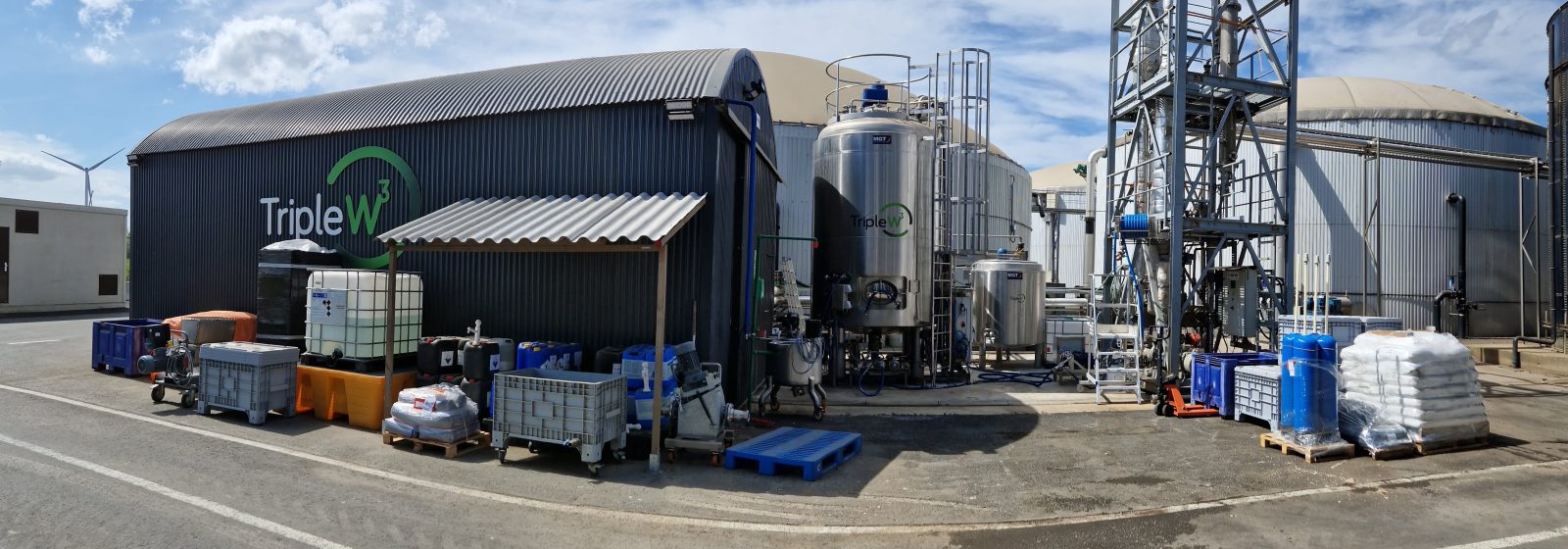TripleW has been operating for several years as a start-up on the site of the fermentation plant of US developer and producer of sustainable organic ingredients, Darling Ingredients, in the port of Antwerp. The company extracts sugars from food waste and converts them into lactic acid. This lactic acid is used as a raw material for the production of bioplastics.
How did you get started?
Maarten Campman, production director at TripleW: “TripleW was founded in 2016 in Tel Aviv, Israel, by a biotechnologist who was experimenting at home in his kitchen with extracting lactic acid from food waste. This was successful and he then brought in a friend who had the expertise to calculate whether it could be turned into a commercial product. Then they started looking for capital. In 2020, they got a push from FIT (Flanders Investment & Trade), which brought them to Antwerp with the demo plant as it stands today. VLAIO also provides subsidies”.
“In addition, together with the transport company Group Op De Beeck and the producer of ecological cleaning products Ecover, we have started a European subsidy process. You can already find our lactic acid in Ecover’s all-purpose and toilet cleaners. If you use food crops to make chemicals or plastics, you get more and more negative reactions from the public. If you process food waste, no one has a problem with it.”
“The fermentation process used here can be seen as the egg of Columbus, because energy (electricity or biogas) can be extracted from it. The next step in the chain is to turn it into a usable material, for example PLA (the thermoplastic polymers made from lactic acid) or bioplastics. PLA is very sustainable and has a life cycle of up to ten years. So you’re not using a food crop and you’re also reducing greenhouse gas emissions.”
Can you build a factory anywhere?
“We can switch and scale up very quickly. Anywhere in the world where there is a digester, we could set up such a plant. Sometimes we have to pay for the supply of bio-waste, but in general we have a negative cost of supply. So at the moment we get the sugars we need to make lactic acid for free. If you were to buy sugar in the normal way, you would pay €1,000 per tonne of sugar. And we lose nothing in the production of lactic acid. From one kilo of sugar, we can produce one kilo of lactic acid.
“In the long term, we can use renewable energy to process our sugar into lactic acid. In general, we use mixed food streams. A lorry full of lettuce, for example, would not be very interesting for our end product as it contains very little sugar. It is a matter of finding the right waste streams, because often you come across waste that is interesting for the animal feed market, and then market prices come into play”.
How does this fermentation process work?
“In our digesters we work with many microorganisms. These can be fungi, yeasts, bacteria or algae. A normal fermentation process – or residence time in the digester – takes about a month. The reaction time to lactic acid is just one day, which is incredibly short. We are looking for the right parameters in which the organisms thrive best.”
“We are on the eve of a commercial story with our demonstration plant. The conceptual project is now being developed further. This will give us an idea of the costs and the flows through the plant. We are currently in talks with a number of companies and expect to be operational as a commercial company by the end of 2025 at the earliest. Roughly speaking, we think it will take us about two years to build a business.”
The fact that you are taking something out of the waste stream, is that detrimental to the further flow in the digester?
“No, on the contrary. It yields much more than if we were not in the chain. So we reinforce each other. This reinforcement is also reflected in our company name, TripleW. It is a ‘triple win’ for us, for the plant we work with and for the environment. Remember that a third of all the food produced in the world is lost in the chain. This provides us with an almost inexhaustible stream of waste for the production of lactic acid.
“Our project has a very good chance of success because, among other things, we can turn a very cheap raw material into a new product with a good selling price. Also, the companies that follow us in the chain only need a product made from residues from the food chain. Many large international companies, such as the electronics giant LG, are interested in our product and technology.
This post TripleW maakt van onuitputbare stroom afval opnieuw bioplastics – Flows first appeared on Flows news site, October 10, 2023.
Image credit: TripleW
